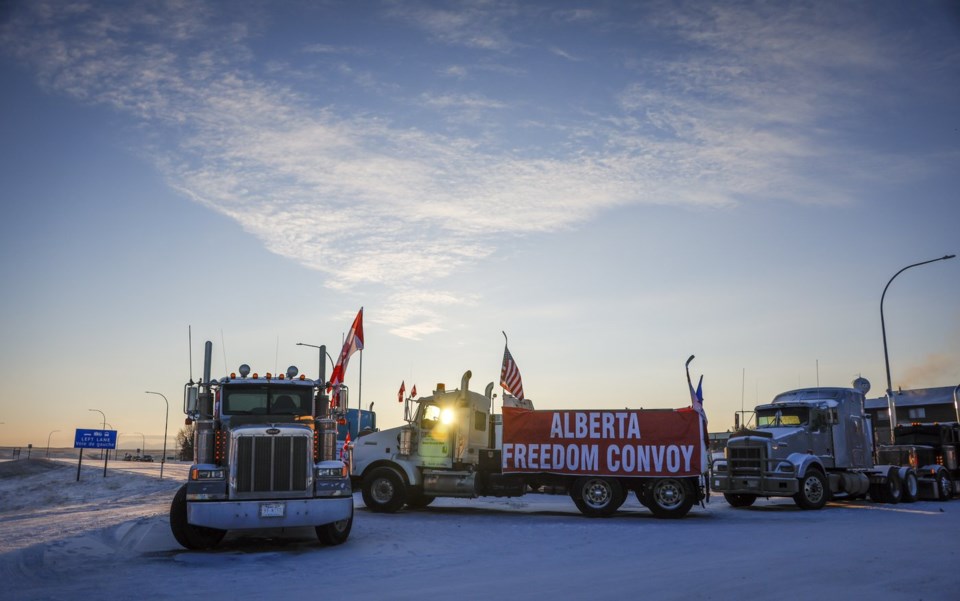LETHBRIDGE, Alta. — The defence lawyer for Chris Carbert says her client is “a bit of a wing nut” who fell down a conspiracy rabbit hole at the border blockade in Coutts, Alta., but that doesn’t make him guilty of conspiring to kill police.
Katherin Beyak, in her closing address to the jury Tuesday, said Carbert is guilty of mischief but not the other charges of conspiracy to commit murder and possession of a weapon for a dangerous purpose.
"He is guilty of mischief. The same cannot be said for the two other counts," Beyak said.
"That Chris agreed to murder police officers while in Coutts, I urge you to find he's not guilty."
Beyak said Carbert spent a lot of time on the internet and came to believe that society was broken, the world was heading for an economic downturn and eventually a civil war.
"He fell down a rabbit hole and said something dumb," she said.
"If there was a conspiracy, Chris was not part of it. He was a bit of a wing nut. There was no plan to kill police."
Carbert and Anthony Olienick are on trial together in Court of King's Bench in Lethbridge, Alta.
They were charged after police found a cache of guns, body armour and ammunition in trailers at Coutts in early 2022.
More weapons, ammunition and pipe bombs were later found at Olienick’s home. Olienick faces an additional charge of possessing a pipe bomb.
Jurors have been hearing evidence for seven weeks about the blockade, which tied up traffic at the busy Canada-U.S. border crossing to protest COVID-19 rules and vaccine mandates.
Olienick never testified at the trial, but Carbert took the stand in his own defence and was questioned about text messages and statements he made.
One text to his mother said, “Mom, I am fine. If they start the violence, I am just telling you there will be war and casualties of war."
The text added, "I don't think you truly understand what this is for and about. If we lose here, I will likely die in war."
Carbert also referred to police as “losers” and “the enemy.”
On the witness stand, he dismissed his statements as reactionary and impulsive and not reflective of his true feelings of respect for police, whom he described as “kind of heroes in western culture.”
In his closing argument, Crown prosecutor Matt Dalidowicz said there was no innocent explanation to what either man claimed to be doing in Coutts.
He said those protesting felt they had reached a breaking point over COVID-19 restrictions and saw Coutts as a turning point that couldn't be allowed to fail.
"They would be the sheepdogs protecting the flock and if the police decided to enforce the law to break up the blockade they would be met with greater force," Dalidowicz argued.
"They brought weapons, ammunition and body armour to the very heart of the blockade. They planned and they prepared. They wanted to kill police officers if the police enforced the law to end the blockade."
Earlier Tuesday, the lawyer for Olienick said he went to the blockade to make a peaceful statement but was instead ensnared by flirting, lying female Mounties.
Marilyn Burns, in her closing argument, said Olienick was a victim of a "disastrous police investigation.”
Three undercover officers infiltrated the protest and testified Olienick told them the blockade was the fight of his life.
They said Olienick considered police the compliant pawns of "devil" Prime Minister Justin Trudeau and that he vowed to slit the throats of officers if they stormed the barricades.
Burns urged jurors to disregard the undercover officers’ testimony, characterizing it as marbled with lies.
"Undercover officers freely admit they are trained to lie," said Burns. "I would submit that was painfully obvious in the course of the trial."
Burns earlier accused one of the undercover officers of flirting with Olienick to obtain information, a practice that would violate legal and ethical rules.
She noted the officer sent Olienick text messages with heart emojis. Burns said the hearts suggest affection, but the officer said they were meant to show approval of the message, not the messenger.
Burns also challenged the allegation that Olienick and Carbert conspired together.
She said Olienick was nothing but an acquaintance of Carbert, who had given him a place to stay to get out of the cold.
“The two men sitting across from you should not be together,” the lawyer said. “Who would Mr. Olienick have conspired to murder police officers with? The answer is no one."
Burns said her client knew any violent exchange with police "would be a certain suicide mission."
"Nobody created any violence. No RCMP officers were harmed," she said.
Burns said it's not unusual for rural Albertans to own firearms, and Olienick's shotgun and .22-calibre rifle that were seized were not illegal.
"These things are like girls in UGG boots Down Under — everyone's got them in rural Alberta."
Justice David Labrenz was scheduled to deliver instructions to jurors Wednesday before they start deliberations.
This report by The Canadian Press was first published July 30, 2024.
Bill Graveland, The Canadian Press




